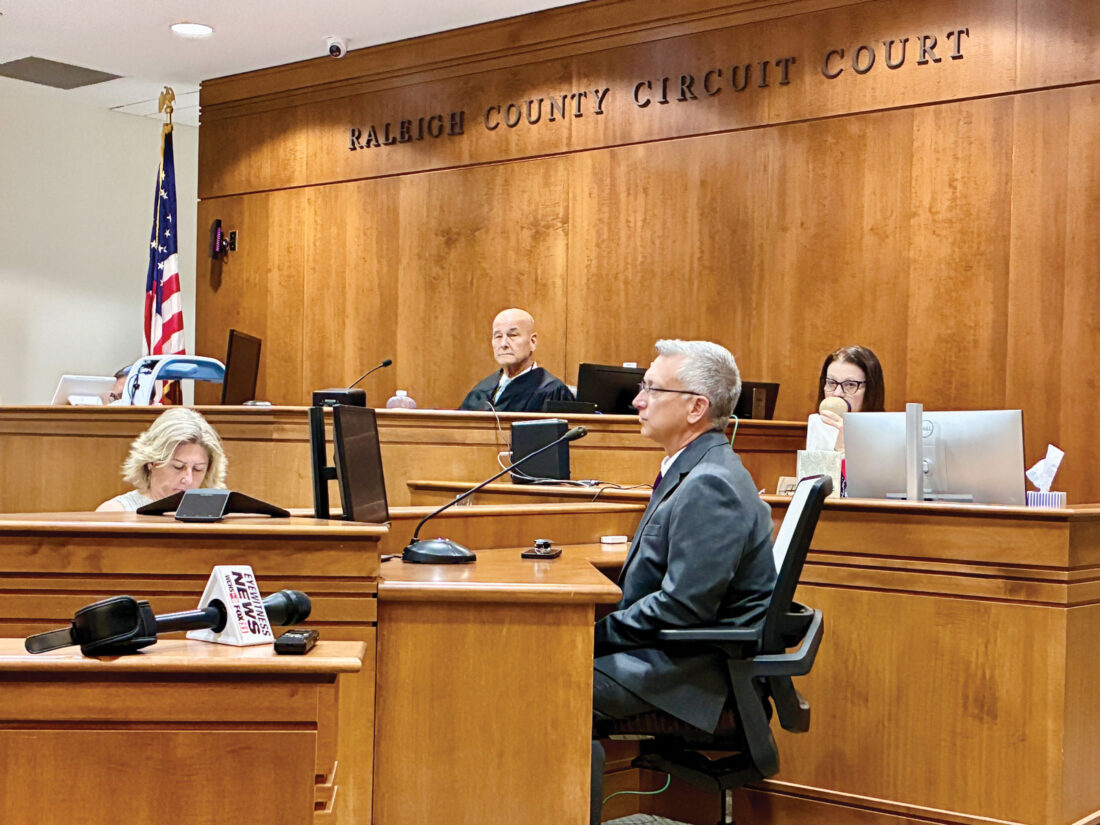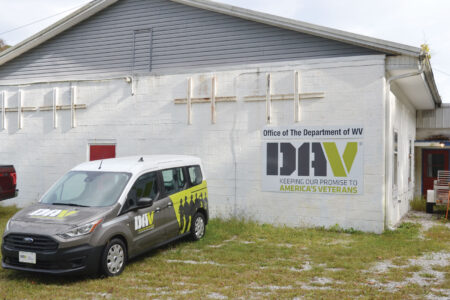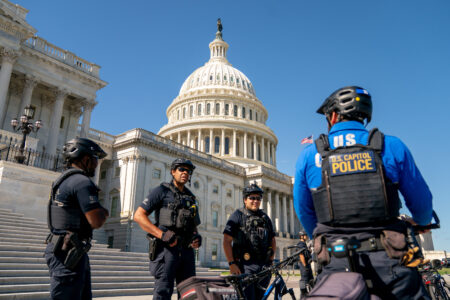Closing arguments made in Raleigh County religious vaccine exemption lawsuit

Fourteenth Judicial Circuit Judge Michael Froble listens as acting State Health Officer Dr. Mark McDaniel takes the stand and answers questions on the final day of a religious vaccine exemption lawsuit in Beckley on Thursday. (Photo by Steven Allen Adams)
BECKLEY — After four days of hearings spread out between September and October, a decision of whether to grant a permanent injunction for a group of Raleigh County parents seeking to force local and state education officials into accepting their religious exemptions to West Virginia’s compulsory vaccine law could come by the end of November. Fourteenth Judicial Circuit Judge Michael Froble heard closing arguments Thursday morning in a case first filed in June by Raleigh County parent Miranda Guzman seeking a permanent injunction against the West Virginia Board of Education, State Superintendent of Schools Michele Blatt, and the Raleigh County Board of Education. Froble already granted a preliminary injunction in the case back in July. The lawsuit sought to block a June 11 unanimous vote by the state Board of Education requiring Blatt to issue guidance to county school systems that they follow the current State Code requiring children attending public and private school to show proof of immunization for diphtheria, pertussis, tetanus, polio, measles, mumps, rubella, varicella and hepatitis B unless proof of a medical exemption can be shown. Gov. Patrick Morrisey, who attended a June press conference with Guzman in support of her lawsuit, signed an executive order in January allowing for religious and conscientious objections to the state’s school vaccination mandates, requiring the commissioner for the Bureau of Public Health/state health officer to establish a process for parents/guardians to request religious or philosophical exemptions to school-age vaccines, only requiring a request in writing from the parent/guardian. Morrisey based his executive order on the Equal Protection for Religion Act (EPRA), created by House Bill 2042 in 2023, which prohibits excessive government limitations on the exercise of religious faith. The law is a key part of Guzman’s lawsuit challenging the state board’s directive. “To trigger EPRA’s requirements, there simply needs to be an allegation of a substantial burden,” said Chris Weist, one of the attorneys for Guzman and the other Raleigh County plaintiffs. “There is not supposed to be a sincerity test. EPRA standards have been met here…courts are not supposed to question the significance of the belief.” Chris Smith, one of the attorneys representing the state Board of Education, said West Virginia’s compulsory vaccine law has been on the books since the 1930s and has been upheld in previous court challenges, with recent attempts by some in the Legislature to amend the law to include religious exemptions failing, including a bill during the 2025 legislative session earlier this year. “For over 80 years, West Virginia Code 16-3-4 has been on the books,” Smith said. “It’s not for lack of trying. The Legislature…has been given the opportunity to create a religious exemption. The governor asked them to do it this year. They didn’t do it, so here we are today. The plaintiffs are using the Equal Protection for Religion Act, which is silent on the vaccination law, to attempt to legislate through litigation.” “Over the years, and recently during the 2025 legislative session, the Legislature has vigorously debated adding a religious exemption to the code,” said Corey Palumbo, an attorney for the Raleigh County Board of Education. “If it was their intent that EPRA would create a religious exemption in the CVL (compulsory vaccine law), they would not have spent so much time the last three years trying to put a religious exemption into the CVL.” Attorneys representing an intervenor in the case, an unnamed teacher in the Raleigh County school system with health issued, harkened back to testimony during the case from public health professionals about the effectiveness of West Virginia’s compulsory vaccination law in limiting and preventing spread of contagious viruses and building up herd immunity in communities, protecting vulnerable populations susceptible to disease. “This is not a case about hostility toward any of the plaintiffs’ religions. This is a case about protecting students and teachers and West Virginians from preventable harm,” said attorney Anna Williams. “This is about keeping public schools safe for everyone who attends them. This is not a case that can function in the abstract; it’s a case about the real consequences when we ignore what public health tells us.” Froble said during the first part of Thursday morning’s hearing that he was prepared to give a ruling in the afternoon, with a written ruling coming later. But attorneys for the plaintiffs and defendants urged him not to rule from the bench. In a 2022 case, the West Virginia Supreme Court of Appeals requires judges to make findings of fact and conclusions of law when conducting cases not involving juries, otherwise the case could be remanded back to the lower court. Later Thursday morning, Froble said he agreed with that request and would likely render a ruling in the case by the end of November or sooner once parties in the case file their findings of fact and conclusions of law by a Nov. 20 deadline. Froble will also render a ruling in a Kanawha County case consolidated into the Raleigh County case brought by two parents whose case seeks a writ of mandamus asking the court to order the Department of Health to only administer medical exemptions to the state compulsory vaccine law, cease granting religious exemptions and rescind all granted religious exemptions. Kanawha County parent Marisa Jackson and Dr. Joshua A. Hess, a pediatric hematologist and oncologist practicing at Marshall Health’s Cabell Huntington Hospital, filed the lawsuit in August. Both parents, represented by the ACLU-WV and Mountain State Justice, have children with health challenges that make them susceptible to illness. “The defendants say they are following the law; they’re following EPRA,” said ACLU-WV Legal Director Aubrey Sparks. “Simply put, the defendants say EPRA permits them to not follow the (compulsory vaccine) law, but they haven’t done the basic steps required to invoke EPRA.” Principal Deputy Solicitor General Holly Wilson, representing the Department of Health, said that the arguments made by the ACLU-WV and Mountain State Justice seeking a writ of mandamus were constantly changing and that any injury to the children of the two parents was hypothetical. “The plaintiffs are trying to win this case by constantly recharacterizing their complaints,” Wilson said. “Now we pivot, and they’re saying something else entirely. Now they’re saying that the defendants are not compliant with the EPRA, which assumes of course that the EPRA applies. Why would we need to comply with a law that doesn’t apply?” In an order issued Wednesday, Froble certified the case as a class action lawsuit on behalf of the more than 570 religious vaccine exemptions granted to date by the state Department of Health’s Bureau of Public Health, whose commissioner – acting State Health Officer Dr. Mark McDaniel – testified Thursday morning. Before Thursday’s hearing ended, questions arose about whether parents in pending court cases across the state against county and state election officials that are not accepting their religious exemptions would be part of the class action matter. In two cases, judges in Mineral County and Berkeley County have upheld the state’s compulsory vaccine law. Wiest proposed that anyone who has received a final judgement in a circuit court case over religious exemptions would not be part of the class action, which won’t be official until a written order is submitted. Those parents in pending cases could either continue with their individual cases or choose to take part in the class action. However, depending on Froble’s final ruling in the case, a motion could be made by the state Board of Education to the state Supreme Court to stay Froble’s ruling pending an appeal. The state board has already appealed Froble’s preliminary injunction in the case to the Supreme Court, which has set deadlines for filings by the parties in the case. Steven Allen Adams can be reached at sadams@newsandsentinel.com.





